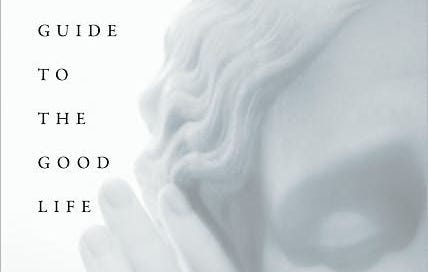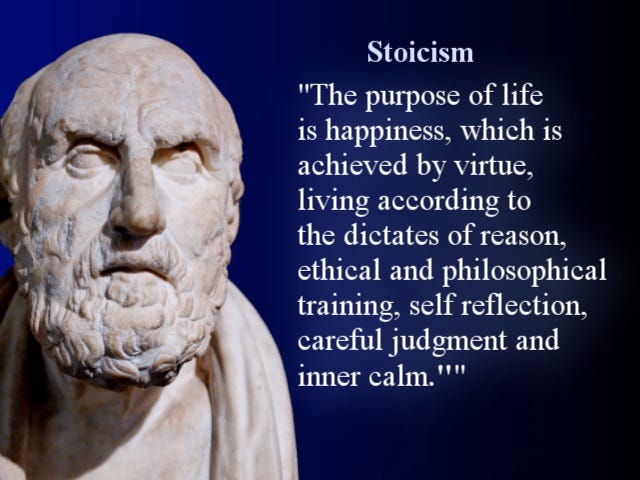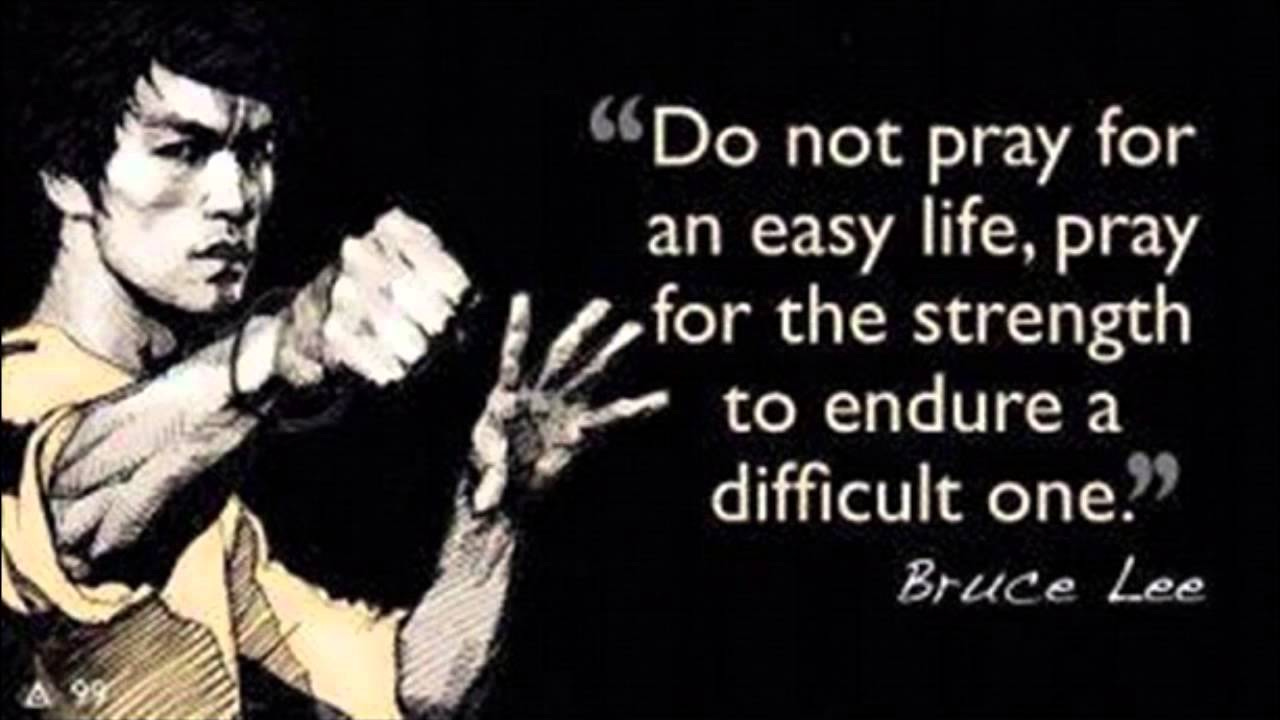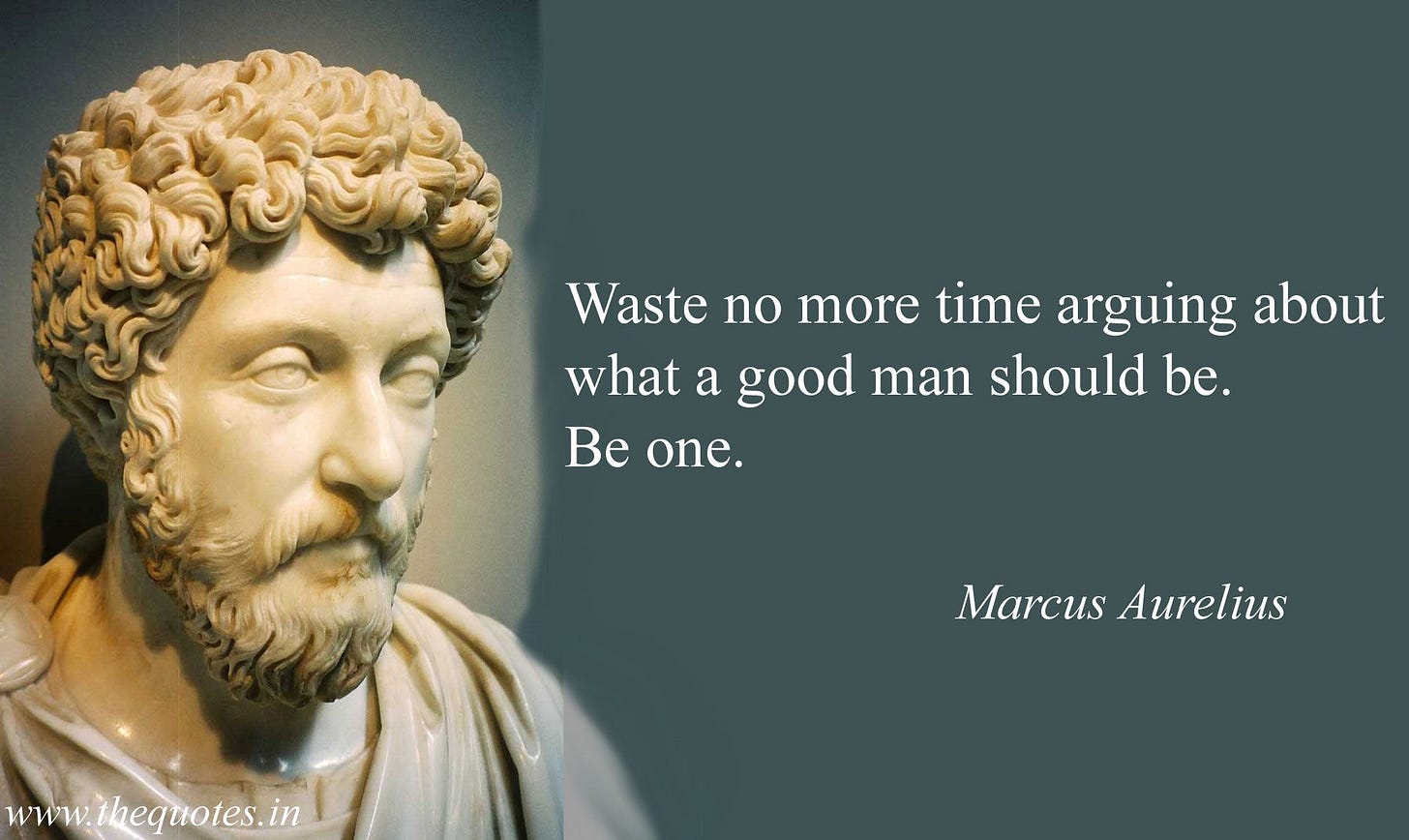“A human being should be able to change a diaper, plan an invasion, butcher a hog, conn a ship, design a building, write a sonnet, balance accounts, build a wall, set a bone, comfort the dying, take orders, give orders, cooperate, act alone, solve equations, analyze a new problem, pitch manure, program a computer, cook a tasty meal, fight efficiently, die gallantly. Specialization is for insects.” —Robert A. Heinlein, Time Enough For Love
Welcome to the Renaissance Humans Newsletter, where I focus on sense-making and story-telling in the turbulent twenties. The Renaissance (“rebirth,” in French) spanned from the 14th to the 17th century and marked a period of cultural, artistic, and intellectual renewal in Europe. A Renaissance Human fosters curiosity, creativity, critical thinking, and character in a journey of never-ending learning. They cultivate Mind, Body, and Spirit, in service of Community, and oriented to the Transcendentals.
BLUF: Stoicism is a philosophy of life that advocates the pursuit of virtue and tranquility, rather than fame, wealth, or pleasure. The goal of Stoicism is not to banish emotions, but to minimize negative emotions and strive for flourishing.
Part I: The Rise of Stoicism
One: Philosophy Takes an Interest in Life. Big jump in sixth century B.C. in philosophical thinking- Italy; Pythagoras (570-500 B.C.), Greece: Thales (636-546 B.C.), Anaximander (641-547 B.C.), Heraclitus (535-475 B.C.). China: Confucius (551-479 B.C.). India: Buddha (563-483 B.C.).1 The biographer Diogenes Laetius divides early western philosophy into an Italian branch (which goes from Pythagoras to Epicurus), and an Ionian branch (which goes from Anaximander to Anaximenes to Anaxagoras to Archelaus to finally Socrates (469-399 B.C.)). Socrates’ main student, Plato founded a school known as “The Academy.” Other key students included Aristuppus (Cyrenaic School), Euclides (Megarian School), Phaedo (Elian School), Antisthenes (Cynic School).
Socrates begins his study with science, but then focused on the human condition- “Pre-Socratic philosophy begins with the discovery of Nature; Socratic philosophy begins with the discovery of man’s soul.” After Socrates’ death, Plato takes up the interest in theory, and Antisthenes inherits his concern with living a good life. Cyrenaics believed that the grand goal of life was the experience of pleasure, while the Cynics advocated an ascetic lifestyle to remove desire and want. Stoics fell in the middle- you should enjoy the good things in life, including friendship and wealth, but don’t cling to them.
Two: The First Stoics. Zeno of Citium (333-261 B.C.) was the first Stoic. Schopenhauer sums up the relationship between the Stoics and the Cynics by saying the Stoics proceeded from the Cynics “by changing the practical into the theoretical.” Stoicism has 3 components- Ethics, Physics, and Logic. Logic is to create a persuasive case for the philosophy. Physics is an attempt to explain the world. Ethics is concerned with eudaemonism2— human flourishing. A proper metaphor is that “Stoic philosophy is like a fertile field, with Logic the encircling fence, Ethics the crop, and Physics is the soil.” From Zeno leadership passes to Cleanthes (331-232 B.C.) and then Chrysippus (282-206 B.C.). From Chrysippus, leadership moves to a succession of leaders, and then to Panaetius of Rhodes, who travels to Rome and exports the philosophy to the Roman Empire in 140 B.C. to guys like Scipio Africanus. The Romans shift the emphasis from the Triad of Logic, Physics, and Ethics to solely the latter. The primary goal of Ethics is the attainment of virtue, and the Romans add the pursuit of tranquility. This is defined as a psychological state marked by the absence of negative emotions like grief, anger, and anxiety, and the presence of positive emotions, such as joy. The pursuit of tranquility aids in the attainment of virtue, since the latter is difficult to pursue without the former—according to the Romans, these two are parts of a virtuous circle. The Greeks were more confident that reason could persuade people to Stoicism, while the Romans were a bit skeptical of this, which is why they added the goal of tranquility.
Three: Roman Stoicism. 4 big Roman Stoics- Seneca, Musonius Rufus, Epictetus, and Marcus Aurelius. Seneca was quite accomplished- a successful playwright, investment banker, senator, and advisor to Emperor Nero. Musonius exiled to island of Gyara in the Aegean Sea in 65 A.D., a barren, lifeless chunk of rock, which was used as recently as 1970 to exile Greek Generals. Epictetus—“It is difficulties that show what men are. Consequently, when a difficulty befalls, remember that God, like a physical trainer, has matched you with a rugged young man.” This is done so you can become an “Olympic victor.” Marcus Aurelius—”Today I shall be meeting with interference, ingratitude, insolence, disloyalty, ill-will, and selfishness- all of them due to the offender’s ignorance of what is good or evil.” Five Good Emperors— Sequence of the best emperors of the Roman Empire, from 96-180 A.D., who brought about “The period in the history of the world during which the condition of the human race was most happy and prosperous.” They were Nerva, Trajan, Hadrian, Antoninus, and Marcus Aurelius. Another Marcus quote- “The art of living is more like wrestling than dancing.”
Part II: Stoic Psychological Techniques
Four: Negative Visualization- What’s the Worst that Can Happen? Visualizing worst-case scenarios helps in several ways.3 1. It helps remove the novelty from stressful situations. It is an antidote to “hedonic adaptation”4 that helps you appreciate what you have already. By contemplating the impermanence of everything in the world, we are forced to recognize that every time we do something could be the last time we do it, and this recognition can invest the things we do with a significance and intensity that would otherwise be absent.
Five: The Dichotomy of Control- On Becoming Invincible. Gain contentment by changing what you desire/value. Divide the world into 3 domains (It’s actually a trichotomy, not a dichotomy)—Areas you have total control, areas you have no control over, and areas where you have partial control. In a competition like a tennis match, you should have internal goals (Perform at your best) vice external goals (Win the tournament). What do we have complete control over (according to Epictetus)? Our opinions, impulses, desires, and aversions.5 Goals we set for ourselves are another. Character is something we have complete control over, according to Marcus.
Six: Fatalism- Letting Go of the Past…. And the Present. The Fates- 3 Goddesses, Clotho wove life, Lachesis measured it, and Atropos cut it. Stoics advocate not fatalism about the future, but about the past. Dwelling on something like death is a waste of time, because the past cannot be changed. They are also fatalists with respect to the present. For example—something shitty happens. We can either spend time wishing it could be different, or we can embrace the moment. If we do the former, life will be mostly dissatisfying, if we do the latter, we can enjoy life as it happens. Another parallel to between Buddhism and Stoicism- to “Live in the moment.”
Seven: Self-Denial- On Dealing with the Dark Side of Pleasure. This is an extension of negative visualization. Instead of simply imagining it, we should actually live it out at times, to inoculate against our fears. We should content ourselves with “the scantiest and cheapest fare (shitty food)” and with “coarse and rough dress (spending night outside like a bum).”6 This will harden us against possible future misfortune—experiencing these minor discomforts will prepare for major ones later. According to Musonius Rufus, the person who tries to avoid all discomfort is less likely to be comfortable than one who periodically embraces discomfort. Also beware of intense pleasures, for these can capture us. Diogenes— “Pleasure hatches no single plot but all kinds of plots, and aims to undo men through sight, sound, smell, taste, and touch, with food too, and drink and carnal lust, tempting the waking and the sleeping alike.” We must learn as Marcus says, to resist the “murmurs of the flesh.” Willpower is a muscle like any other- when you exercise it, it grows stronger.
Eight: Meditation- Watching Ourselves Practice Stoicism. Create an observer within you who watches and comments on our attempts to practice Stoicism. Reflection on your progress is a key part of the journey. Use a checklist, like: Do you periodically engage in negative visualization? Do we take the time to distinguish between those things over which we have complete control, those things over which we have no control at all, and those things which we have some but not complete control? Are we careful to internalize our goals? Have we refrained from dwelling on the past and instead focused our attention on the future? Have we consciously practiced acts of self-denial? Signs of progress on your journey, according to Epictetus: We stop blaming, censuring, and praising others We stop boasting about ourselves and how much we know We will blame ourselves, and not external circumstances when desires are thwarted Because we have mastered our desires, we have fewer of them We come to regard ourselves not as a friend whose every desire must be satisfied, but “as an enemy lying in wait.” BUT- we should be so inconspicuous in our Stoic practices that others don’t label us as such. The overall goal is not to ultimately become the ideal Stoic “sage”, but according to Seneca to take our progress as adequate if “every day I reduce the number of my vices, and blame my mistakes.”
Part III: Stoic Advice
Nine: Duty- On Loving Mankind. According to the Stoics, the primary function of man is to be rational, and to use this reason to discover our secondary functions. One of those is a social duty—a duty to mankind. When someone says they want to be perfectly straightforward with us, we should be on the lookout for a concealed dagger- Marcus. A social fellowship with other members of our society is an important function of Stoicism.
Ten: Social Relations- On Dealing with Other People. Vices can be contagious, according to Seneca, and can spread from person to person. Practice Social fatalism- just accept that people will act in accordance with their nature. Stoics (like other Greeks) warn about the destructive nature of sex, but are big proponents of marriage, and having children.
Eleven: Insults- On Putting up with Put-Downs. When insulted, stop and reflect if the insult is actually true or not. If so, why are you offended? What upsets people is not things themselves, but our judgment about these things- Epictetus. Another method is to retort that if the insulter really knew you, instead of pointing out X he should have pointed out Y and Z. Another response is to make no response.
Twelve: Grief- Vanquishing Tears with Reason. Retrospective negative visualization—feeling gratitude and thanks for the time that you had, rather than regret for what you’ve lost.7
Thirteen: Anger— On Overcoming Anti-Joy. It’s rarely good to get angry. According to Seneca— “Reason will never enlist the aid of reckless unbridled impulses over which it has no authority.” Feigning anger to get a desired result (as in a rhetorical speech, say) is OK, but actually getting angry is “purposeful insanity.” Use humor to defuse the situation, contemplate the impermanence of the world around us. Also use the body language hack— calm your features and breathing in order to calm your inside. Slow your pace, soften your voice, relax your face.
Fourteen: Personal Values— On Seeking Fame. Be indifferent to fame, it is a dead end by itself. You might achieve fame as a byproduct of your other endeavors, but don’t chase it alone— it is empty and hollow.
Fifteen: Personal Values— On Luxurious Living. Again, you may achieve riches, but don’t pursue them as an end, or grow overly attached to them. According to Seneca, we should “strive for an amount that does not descend to poverty, but not yet far removed. “The man who adapts himself to his slender means and makes himself wealthy on a little sum, is the truly rich man”- Seneca.8
Sixteen: Exile— On Surviving a Change of Place. Many Stoics have been banished over time. Make the most of it; you still have your nature and your virtue with you. Many have been changed for the better by it.
Seventeen: Old Age- On Being Banished to a Nursing Home. This is current day exile in our society. According to Seneca, old age has its benefits. One losing his sex drive— “How comforting it is to have tired out one’s appetites, and to have done with them!” Sophocles had another view. When asked is he could still make love to a woman, he answered, “I am very glad to have escaped from this, like a slave who has escaped from a mad and cruel master.”
Eighteen: Dying- On a Good End to a Good Life. Die well; don’t cling to life at any cost. Suicide is always an option if you cannot live in accordance with your virtue. A life in which nothing is worth dying for is not worth living. To be clear, the Stoics are against suicide for despair or dissatisfaction with life. They are referring to some specific sets of circumstances here— kind of like in Game of Thrones when defeated nobles are ask to bend the knee, and they instead say “I wish you good fortune in the battles to come.” These nobles would rather die than compromise their virtues.
Nineteen: On Becoming a Stoic- Start Now and Prepare to be Mocked. Practice stealth stoicism- don’t tell people about your practice. Keep a low profile. People often dismiss such a practice as it takes much energy and time. But the counter to this is it takes more effort to NOT have a philosophy of life, in time and cost wasted.
Part IV: Stoicism For Modern Lives
Twenty: The Decline of Stoicism. Some historians point to the decadence of Roman society for the decline, others to the lack of charismatic teachers. Still others cite its competition with Christianity for adherents. Seneca says “A man is as wretched as he convinces himself that he is.” Stoics are not fans of considering yourself a victim. Bad things happen to humans of all kinds, as part of the process of living. But it is how we process and frame those bad things that will determine if we can move forward. It’s the difference between Post-Traumatic Growth and Post-Traumatic Stress.
Twenty-One: Stoicism Reconsidered. In the pursuit of tranquility, Stoics became keen observers of humanity. The philosophy asks humans to become self-aware, to practice introspection and reflection. How did we respond to the day’s events? Use our reasoning ability to overcome negative emotions. If something is pleasurable but disrupts tranquility, avoid. Don’t pursue wealth, but if you achieve it, enjoy it while not clinging to it. We are social creatures; we must form relations with others, but avoid those who are corrupt. Others can disrupt our tranquility, practice methods to deal with this. Practice negative visualization, imagine losing our prized possessions, and contemplate impermanence of all things. Practice poverty—voluntarily forgo opportunities for pleasure and comfort. Don’t worry about things outside of our control. With things partially under our control, we must internalize our goals. Things in our control—Desires, impulses, aversions, opinions, and thoughts. Be fatalistic with regard to the outside world. What happened in the past and the present are outside of our control, so it is foolish to get upset with it. Don’t be fixated on the deity aspect of Stoicism; something can work even in light of flawed reasons for doing so. It’s about overcoming our evolutionary programming, which is to create anxiety and fear (example, social status/wealth/resource-seeking behavior) in some circumstances and pleasure in others (insatiable sex drive), in order to facilitate procreation. You can reject the Stoic logical proof of Stoicism (Zeus et al) without rejecting Stoicism itself. Example—the reason aspirin works. Cultures for thousands have years have known that willow bark (contains aspirin ingredients) works, but did not know why. Only modern science has explained this.
Twenty-Two: Practicing Stoicism. Don’t try to do everything at once, a little at a time. Negative visualization should be a part of everything. Then, move onto the trichotomy of control, and look for places you can help friends and family with this. Layer in fatalism about the past and present. Other people are obstacles in our path towards tranquility, so be prepared for the insults and the curveballs they send your way. Use self-deprecating humor whenever possible. Get uncomfortable, practice things that take you out of your comfort zone. Your other self is your opponent— the one who wants comfort and pleasure.
Currere Certamen Tuum
This is typically called the Axial Age.
Literally— “Eu” is good and “daemon” is spirit or divine power.
Negative Visualization is a technique I found Ground Force Commanders employed to great effect while researching my Master’s Thesis.
Which is when you continue to get used to an increased standard of living, AKA The Hedonic Treadmill, Keeping Up With The Jones.
Notice this recognizes that we don’t have control over our bodies— illness can befall us in a manner out of our control.
Marcus Aurelius quote.
Best example of this in poetic form: https://poetryarchive.org/poem/god-abandons-antony/
Although, to be clear, Seneca was very wealthy, more than he’s advocating here.








Wonderful summary. I've got a stoic post in draft for over two years. Trying to figure out the right angle to write it.
Quite a bit to ponder but it does seem to hang together rather well, a cohesive moral philosophy seems to be the result of a thorough study of our real history. I do like the way the various thinkers and their ideas are linked and put in parallel timelines. Maybe there is an evolution to human thought. Worthy of study